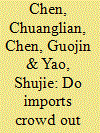| Srl | Item |
| 1 |
ID:
174860


|
|
|
|
|
| Summary/Abstract |
The effectiveness of public diplomacy is now increasingly the subject of scientific measurement and testing by researchers in the field of International Relations. While there are variety of empirical efforts to uncover the power of public diplomacy, extant studies have mostly focused on the activities initiated by the ministries in charge of external relations. In this article, rather than external relations ministries and agencies, we focus on the effectiveness of public diplomacy by the military. Specifically, we argue that figures, pictures and indeed videos created by military forces have power in changing perceptions among the receivers of the information. In this particular study, we show that a 38 second video made by the US military induces positive feelings for cooperation which would otherwise be difficult to sustain between South Korea and Japan — two countries which have suffered highly fractious relations, yet which are indispensable allies to the US in countering the rising threat from North Korea.
|
|
|
|
|
|
|
|
|
|
|
|
|
|
|
|
| 2 |
ID:
116525


|
|
|
|
|
| Publication |
2012.
|
| Summary/Abstract |
A decline in the relative price of imported goods compared to that of domestically produced goods, e.g., caused by domestic currency appreciation, may have different effects on domestic consumption. Such effects may not be accurately detected and measured in a classical permanent-income model without considering consumption habit formation as pointed out by Nishiyama (2005). To resolve this problem, this paper employs an extended permanent-income model which encompasses consumption habit formation. Both cointegration analysis and GMM are used to estimate the (modified) intertemporal elasticities of substitution (IES) between imports and domestic consumption and the parameters of habit formation as well as the (modified) intratemporal elasticities of substitution (AES). We find that import and domestic consumptions are complements in China, but substitutes in Japan and Korea. Different per capita incomes and consumer behaviors between China and the other two countries are two possible reasons for different relationships between import and domestic consumptions.
|
|
|
|
|
|
|
|
|
|
|
|
|
|
|
|
| 3 |
ID:
156806


|
|
|
|
|
| Summary/Abstract |
The territory contested in island disputes is often of low intrinsic value from the national security and economic perspectives. This generally implies a stable status quo where both sides prefer peace to war. Yet island disputes commonly produce a variation whereby states engage in some degree of ‘hawk-talk’—more or less confrontational rhetoric and related, symbolically important policies. Theoretically, hawk-talk should be more likely when the disputing countries have a strong, nationalistically salient history of conflict and less likely when they have high levels of cooperation in other national security areas or economic relations. Hawk-talk is expected to beget more hawk-talk, thus to increase the ideological and diversionary political value of assertiveness in island disputes, and to limit or reduce cooperation. Nationalistically salient histories of conflict amplified by hawk-talk can most easily be shown to raise the stakes and risks in low intrinsic value disputes. Yet such histories are expected to have an even greater potential impact on high intrinsic value disputes. We illustrate this logic by analysing the low-intrinsic-value dispute between Korea and Japan over the Dokdo/Takeshima Islands. Both the theory and the case study imply that cooperation in other areas does not constitute a reliable antidote to hawk-talk–driven dispute escalation. Countervailing national interest ideologies, which emphasise other objectives imperilled by dispute escalation, are the most promising complement to increased cooperation.
|
|
|
|
|
|
|
|
|
|
|
|
|
|
|
|